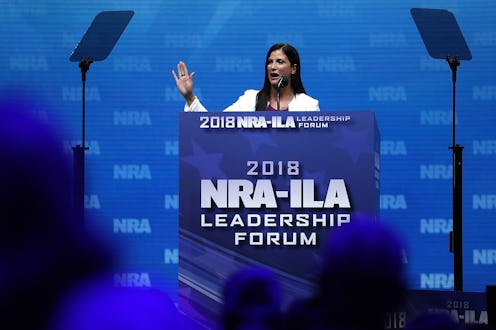News
The NRA's Biggest Donors Can Be Kept Secret Now & It Matters More Than You Think

Holding politicians accountable for where they choose to donate large amounts of money is about to be a little bit more difficult. Many of the NRA's biggest donors are now going to be able to keep their donations anonymous, according to a new law that will allow nonprofit groups to keep private the information of donors who give $5,000 or more. The rule was announced on Monday by the Treasury Department, which said that this information was never supposed to be subject to public disclosure to begin with.
Rather, Senior Treasury officials clarified that "donor lists have been inadvertently released in the past," CNN reports, and that groups from both the left and the right side of the partisan aisle were becoming concerned that people would soon feel nervous about giving donations if their names were easily disclosed to the public.
Here's what's going to change, and what won't: nonprofit groups which receive tax-deductible donations (like charities) will still have to report the information of their biggest donors, but other nonprofits that don't receive tax-deductive donations will not. The NRA falls into the latter bracket, which means that it will no longer have to report information on its major donors.
This is a potential problem for several reasons. For one, it will make it more difficult for the American people to be able to ascertain which politicians are supporting politically active nonprofits like the NRA. But perhaps more importantly, these new rules might make it easier for nonprofits like the NRA to hide foreign contributions.
This is a especially relevant concern, given the growing fears and increasing information regarding Russian political involvement in U.S. elections and lawmaking.
Just four days ago, a federal grand jury indicted Russian spy Marina Butina on charges of conspiracy and acting as a foreign agent. Butina had extensive ties to the NRA, which, the case claims, she was using to create political relationships and "back channel lines of communication" to further Russia's agenda.
What's more, it was revealed in April that the NRA has received donations from dozens of Russian nationals since 2015. More specifically, it has received donations from approximately two dozen individuals with Russian addresses, totaling approximately $2,512 in donations.
Given the increasing amount of evidence of Russian collusion in the 2016 election, the information of Russian donations to politically active nonprofits is obviously of critical importance. So now that the NRA won't have to disclose who its donors are, it could make it infinitely more difficult to follow trails of potential corruption or collusion via the NRA or other politically minded nonprofits.
Robert Maguire, a political nonprofit investigator for the Center for Responsive Politics, said to CNN of the change in nonprofit disclosure laws, "The IRS is already a toothless watchdog when it comes to overseeing nonprofits. But it should have donor information that it can use to effectively oversee the political activity of these groups."
He continued, "It's a boon to anyone who wants to spend large amounts of money on politics without any accountability."
Even if you aren't concerned at the idea of Russian nationals influencing American politics by donating heavily to specific politically active nonprofits, you might be concerned about your ability to make an informed vote on your own political representatives, since you will no longer be able to know all the organizations they're supporting.
As Vox puts it, "dark money is about to get a little darker."
Furthermore, Vox notes that the Campaign Legal Center, which is an election spending watchdog, estimated that the NRA's 501 (c) (4) arm spent approximately $35 million in dark money in the 2016 election. In other words, the NRA spent $35 million on the election, and that $35 million came from sources that are currently unknown.
This new rule will make it that much harder for anyone to know where the NRA — or any other political nonprofit, for that matter — is getting its money, and in turn, its power.